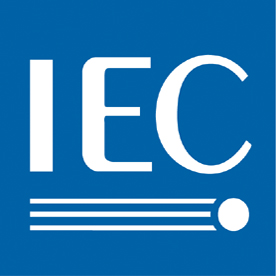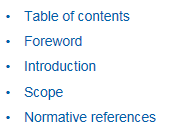ISO/IEC 26513:2009 Withdrawn
Systems and software engineering - Requirements for testers and reviewers of user documentation
Note: this publication has been replaced by ISO/IEC/IEEE 26513:2017
Abstract
ISO/IEC 26513:2009 supports the interest of software users in receiving consistent, complete, accurate, and usable documentation. It defines the process in which user documentation products are tested.
ISO/IEC 26513:2009 is intended neither to encourage nor discourage the use of either printed or electronic (on-screen) media for documentation, or of any particular documentation testing or management tools or methodologies.
ISO/IEC 26513:2009 specifies processes for use in testing and reviewing of user documentation. It is not limited to the test and review phase of the life cycle, but includes activities throughout the Information Management and Documentation Management processes.
ISO/IEC 26513:2009 provides the minimum requirements for the testing and reviewing of user documentation, including both printed and on-screen documents used in the work environment by the users of systems software. It applies to printed user manuals, online help, tutorials, and user reference documentation.
The order of clauses in ISO/IEC 26513:2009 does not imply that the software user documentation should be tested in this order.
In each clause, the requirements are media-independent, as far as possible. The informative checklists found in Annexes A and B may be used at each phase of the documentation process to verify that the appropriate steps have been carried out, and that the finished product has acceptable quality.
ISO/IEC 26513:2009 can be helpful for testing and reviewing the following types of documentation:
ISO/IEC 26513:2009 is applicable to testers, reviewers, and other related roles, including a variety of specialists:
It can also be consulted by those with other roles and interests in the documentation process.
Managers of the software development process or the documentation process should consider the testing of documentation as part of their planning and management activities. Project managers, in particular, have an important role in planning the testing and reviewing of documentation.
Testing of the documentation is likely to highlight any defects or nonconformances in tools that are used to create or display on-screen documentation. Similarly, usability testing of the documentation is likely to highlight defects or nonconformances with the presentation or layout of documentation and associated graphics and other media. As a result, there are a number of roles that should be involved in the testing of documentation because their work affects the content, display or presentation of documentation for the user, for example, developers of tools for creating on-screen documentation, graphic designers producing material displayed as part of the documentation, and human-factors experts who identify principles for making documentation more accessible and easily used, also user interface designers and ergonomics experts working together to design the presentation of the documentation on-screen. In some organizations these roles may have different titles, or an individual may perform more than one of these roles.
There are other roles that need to understand the test processes for the documentation, for example authors should understand the test processed for the documentation that they have produced, and acquirers of documentation prepared by another department or organization, might want to know what testing has been performed and the processes followed for the documentation that they are acquiring from a supplier.
ISO/IEC 26513:2009 is intended for use in all types of organizations, whether or not a dedicated documentation department is present. In all cases, it may be used as a basis for local standards and procedures. Readers are assumed to have experience or general knowledge of testing or reviewing processes.
ISO/IEC 26513:2009 deals with the evaluation of documentation only, and not with the evaluation of the software it supports. Documentation is also included in evaluation of the software product, as in the ISO/IEC 25000 series of standards, in particular, ISO/IEC 25051:2006 Software engineering — Software product Quality Requirements and Evaluation (SQuaRE) — Requirements for quality of Commercial-Off-The-Shelf (COTS) software product and instructions for testing.
ISO/IEC 26513:2009 is intended neither to encourage nor discourage the use of either printed or electronic (on-screen) media for documentation, or of any particular documentation testing or management tools or methodologies.
ISO/IEC 26513:2009 specifies processes for use in testing and reviewing of user documentation. It is not limited to the test and review phase of the life cycle, but includes activities throughout the Information Management and Documentation Management processes.
ISO/IEC 26513:2009 provides the minimum requirements for the testing and reviewing of user documentation, including both printed and on-screen documents used in the work environment by the users of systems software. It applies to printed user manuals, online help, tutorials, and user reference documentation.
The order of clauses in ISO/IEC 26513:2009 does not imply that the software user documentation should be tested in this order.
In each clause, the requirements are media-independent, as far as possible. The informative checklists found in Annexes A and B may be used at each phase of the documentation process to verify that the appropriate steps have been carried out, and that the finished product has acceptable quality.
ISO/IEC 26513:2009 can be helpful for testing and reviewing the following types of documentation:
- documentation of products other than software, for example, hardware or devices;
- multimedia systems using animation, video, and sound;
- computer-based training (CBT) packages and specialized course materials intended primarily for use in formal training programs;
- documentation produced for installers, computer operators, or system administrators who are not end users;
- maintenance documentation describing the internal operation of systems software.
ISO/IEC 26513:2009 is applicable to testers, reviewers, and other related roles, including a variety of specialists:
- usability testers, documentation reviewers, and subject-matter experts;
- information designers and architects who plan the structure and format of products in a documentation set;
- usability specialists and business analysts who identify the tasks the intended users will perform with the software.
It can also be consulted by those with other roles and interests in the documentation process.
Managers of the software development process or the documentation process should consider the testing of documentation as part of their planning and management activities. Project managers, in particular, have an important role in planning the testing and reviewing of documentation.
Testing of the documentation is likely to highlight any defects or nonconformances in tools that are used to create or display on-screen documentation. Similarly, usability testing of the documentation is likely to highlight defects or nonconformances with the presentation or layout of documentation and associated graphics and other media. As a result, there are a number of roles that should be involved in the testing of documentation because their work affects the content, display or presentation of documentation for the user, for example, developers of tools for creating on-screen documentation, graphic designers producing material displayed as part of the documentation, and human-factors experts who identify principles for making documentation more accessible and easily used, also user interface designers and ergonomics experts working together to design the presentation of the documentation on-screen. In some organizations these roles may have different titles, or an individual may perform more than one of these roles.
There are other roles that need to understand the test processes for the documentation, for example authors should understand the test processed for the documentation that they have produced, and acquirers of documentation prepared by another department or organization, might want to know what testing has been performed and the processes followed for the documentation that they are acquiring from a supplier.
ISO/IEC 26513:2009 is intended for use in all types of organizations, whether or not a dedicated documentation department is present. In all cases, it may be used as a basis for local standards and procedures. Readers are assumed to have experience or general knowledge of testing or reviewing processes.
ISO/IEC 26513:2009 deals with the evaluation of documentation only, and not with the evaluation of the software it supports. Documentation is also included in evaluation of the software product, as in the ISO/IEC 25000 series of standards, in particular, ISO/IEC 25051:2006 Software engineering — Software product Quality Requirements and Evaluation (SQuaRE) — Requirements for quality of Commercial-Off-The-Shelf (COTS) software product and instructions for testing.
Additional information
| Publication type | International Standard |
|---|---|
| Publication date | 2009-10-09 |
| Withdrawal date | 2017-10-30 |
| Edition | 1.0 |
| Available language(s) | English |
| TC/SC | ISO/IEC JTC 1/SC 7 - Software and systems engineeringrss |
| ICS | 35.080 - Software |
| Stability date | 2017 |
| Pages | 54 |
| File size | 437 KB |
The following test report forms are related:
Share your publications
Learn how to share your publications with your colleagues, using networking options.
Payment information
Our prices are in Swiss francs (CHF). We accept all major credit cards (American Express, Mastercard and Visa, JCB and CUP), PayPal and bank transfers as form of payment.
Keep in touch
Keep up to date with new publication releases and announcements with our free IEC Just Published email newsletter.
Contact customer services
Please send your enquiry by email or call us on +41 22 919 02 11 between 09:00 – 16:00 CET Monday to Friday.

